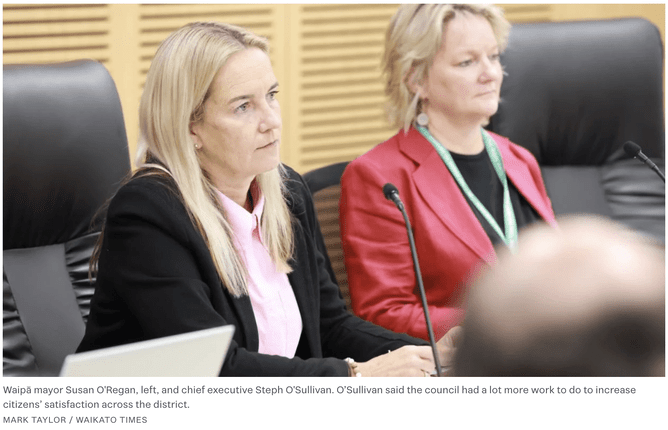Waipā can’t get no satisfaction
Written by Matthew Martin - WAIKATO TIMES
Fewer than one in five Waipā district residents say they’re “satisfied” with their council’s overall performance, and faith in its financial management has dropped to a record low.
Council chief executive Steph O’Sullivan said the results of the council’s annual residents survey reflect the difficult environment the council and community were operating in, but had stabilised after satisfaction declined post-Covid and began to recover in 2024.
While the council said in a press release that this year’s survey results found “no significant declines across key measures”, analysis of its data told a different story.
The report shows a continuing decline in overall performance ratings, down from 22% in 2024, and 27% in 2021, to just 19% in 2025.
In 2020, satisfaction in council’s overall performance was 40%.
Just 13% of residents believe they receive good value for money, down from 16% last year, and only 8% are satisfied with the council’s financial management - both the lowest scores on record.
The Waipā District Council Residents’ Survey was conducted by Key Research using online and hard copy questionnaires asking questions of 421 randomly sampled locals with a margin of error of ±4.77%.
Issues with roading, footpaths, cycleways, and parking were the main concerns of 45% of those surveyed with 25% saying they were more concerned by rates rises and “value for money”.
Satisfaction with the council’s overall leadership continued to drop in 2025 with a satisfaction rating of 20%, down from 40% in 2020.
“With the exception of ‘council playing a positive role in the social, environmental, economic and cultural recovery for our district’ (22%), all leadership-related attributes have seen a decrease in satisfaction over the past year”, the report states.
While performance in core services has seen modest gains, the report identifies financial accountability and strategic leadership as areas requiring urgent attention.
However, O’Sullivan said the results weren’t all bad with the survey highlighting strengths in the district’s parks, community facilities, and open spaces, which remain highly valued by residents.
Satisfaction with water management increased to 43%, up from 37% in 2024, and the handling of enquiries by staff also saw a notable lift with 52% satisfied by how their query was managed, up from 41% last year.
More than half (55%) of residents said they were “proud to live in the district”.
This was significantly higher among Cambridge residents at 62%, compared to 44% in Te Awamutu.
“Elected members had to make tough trade-off decisions through the long-term plan to balance affordability with the need to invest in growth and infrastructure,” O’Sullivan said.
“Despite this, residents are telling us we’re holding steady, which is a strong platform to build on and we have a number of initiatives already underway to address many of the issues raised.”
Overall satisfaction among Māori living in the district was 10% compared to non-Māori at 21%, and Māori residents consistently reported lower satisfaction, engagement, and inclusivity compared with non-Māori, especially in opportunities to participate in decision-making and cultural recognition.
O’Sullivan said the recent appointment of strategic Māori partnerships director Ngira Simmonds would help strengthen partnerships with iwi and mana whenua.
Younger residents also reported lower satisfaction and limited opportunities to participate in decision-making.
“On balance, these results show we are on the right track, but we want to ensure all voices are heard, and there is still much work to do,” O’Sullivan said.
“We’re focused on continuing to improve core services, building authentic partnerships, and creating meaningful opportunities for our community to have a say.
“Every voice counts and our aim is to be an inclusive and responsive council. If everyone is not heard, then no one is heard.”
Comments from residents referenced issues with spending priorities, rates, and financial transparency.
"Any wasteful spending needs to be stopped immediately," one person wrote.
"Why do we need a new library in Cambridge?", said another.
Others questioned the need for overseas travel by elected members and called for better prioritisation of essential infrastructure.
“The new cycleways and roads are terrible and unsafe,” another local said.
“Too many speed bumps and some of them are massive, which is totally a waste of money in terms of installing them and slowing down every single car.
“Whatever they do and plan, it needs to be fit for purpose, be essential and be within budget,” they said.
